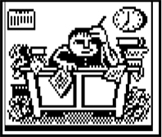by Gary Moore
X100, San Francisco
 Tuesday morning. In at 8:30, upstairs, 8th floor, and out on the balcony of the Program Director's office. On the street below, parked at the corner of Bush and Kearny, is that big, stupid boom box; a reminder on wheels that the All New X-100 is here!
Tuesday morning. In at 8:30, upstairs, 8th floor, and out on the balcony of the Program Director's office. On the street below, parked at the corner of Bush and Kearny, is that big, stupid boom box; a reminder on wheels that the All New X-100 is here!
Promo time!!! Get with promotions and hit the production room with a promo that will make people start buying lunch. Depending upon your situation, you either voice your own or produce someone else's voice. If you voice your own, there's a good chance that you write it, too.
The script is complete and it's time to put this masterpiece of artwork together. First off, I review the script, visualize the concept, and decide how I want this thing to sound. I have discovered that taking up to 3 hours or more is not an unreasonable time frame to assemble a great piece of work. If you can find that much extra time in a week, bless you. The script is only 45 seconds long. Why then, would it take such a long time to complete the product? What makes promo production so time consuming is finding the appropriate music beds, sound effects, voice effects, and 15 other elements you plan to include. Not only do you have to locate the tools, but sometimes you have to practice a mix several times before you ever put it down on tape. Preparation is the key.
I currently produce promos at X-100 in San Francisco. However, I produce someone else's voice and have found some good ways to widen my creativity. I receive my material at least a day in advance, and the scripts originate in house, so I already have an edge. Here's the starting point.
I thoroughly read the scripts for a day. I put them in my bag and take them home. The next day I get the voice tracks first thing in the morning. I already have a plan. I then get my second creative incentive.
I transfer the material onto a cassette and take it home. I commute an hour each way to and from work on a train, listening to the tape. I come back the next morning with a plan and know exactly where to start. I'm fresh and ready for some hard core multi-¬tracking.
Our studio is equipped with an 8-track Studer with remote, 3 Studer 2-tracks, 2 fine turntables, 3 cassette decks, digital reverb, and an Eventide Harmonizer. Other instruments include a Flyweight sampler. Now the promo.
I immediately know how to start, some sort of sting or blast as an attention getting sound. Then the first line, in my case, "The All New X-100, your station for all the hits...pays you for knowing them!" Stab!! That line plus the opening sound go on one track. In this case track 4. I use tracks 4 and 5, keeping the voice, which should dominate in all cases, close to the middle of the tape for best sound and clarity. Remember, nothing is rule! The second element is line two of the promo going to track 5; "Keep it here! In minutes you'll hear our shortcuts to cash!" (Sting) "The winning is up to (effected) 9,900 dollars!" Stop! By using a window for this last element, the dollar amount can be changed without laying the other tracks again. This works well in other cases, as you know or will discover. You can bounce voice tracks back and forth all day in the middle and leave tracks 1-3 and 6-8 available for other stuff such as music, work parts, effects, sounds, or reinforcement moves.
One great addition to my production library is a collection of work parts. I stock them and save them, especially winners! I give each jock a full 5 inch reel of clean tape at the beginning of each week for contests. I have them leave it in my basket daily so I can go through it. Usable portions of their tape are removed and spliced onto my master. Once their tape is full of splices, I give them a reel of new tape. Other work parts to add to a collection are short drop-ins. For example: "In Minutes", "Cash", "Another Winner", "All Weekend Long", "This Friday at 3", and hundreds of other phrases. If you work with someone else's voice, have him give you a tape full of lines. You'll find, the more work parts you have, the less you'll have to depend on others to get voice tracks to you. These come in real handy for a winner promo. If I have the appropriate voice tracks in stock, I can put together a winner promo quickly without having to wait for voice tracks from someone else.
Next month, more tips on promo production and more ideas to help expand your creativity.
♦

